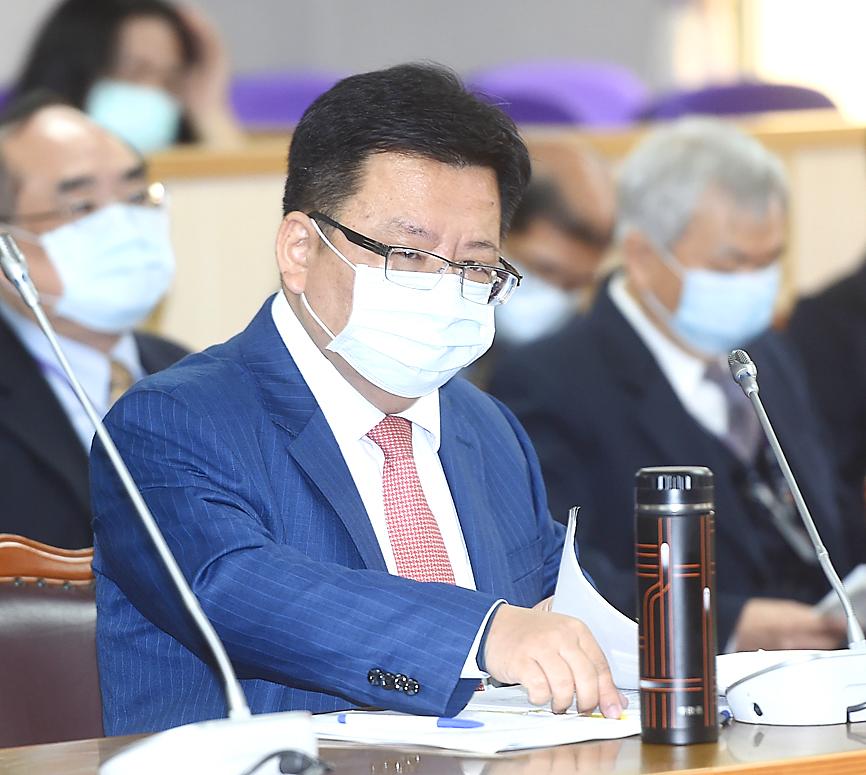The Presidential Office’s information security budget would be increased by 50 percent next year, as it faces an overwhelming 400,000 cyberattacks per month on its computer systems, officials said yesterday.
The legislature’s Judiciary and Organic Laws and Statutes Committee yesterday held the latest in a series of meetings examining annual budgets for next year, during which legislators raised the issue of information security.
As part of its budget for next year, the Presidential Office allocated NT$38.97 million (US$1.37 million) to “administrative work for preserving information security.”

Photo: Chien Jung-fong, Taipei Times
The funds would go toward software and equipment to defend the office’s computer systems against malware and information leaks, Presidential Office Deputy Secretary-General Lee Chun-yi (李俊俋) said.
As a government agency, the office is required to protect its information, as stipulated in the Information and Communication Security Management Act (資通安全管理法), he said.
The office’s cybersecurity budget is about NT$13 million more than was budgeted last year, he said, adding that it was also allocating NT$733,000 to research and develop a better cybersecurity plan.
Ho Chuan-te (何全德), who is in charge of cybersecurity at the Presidential Office, said that it would take a more proactive approach regarding cyberdefenses.
The office would focus on installing antivirus software more widely and better equipping the server room, he said, adding that it would invite researchers to advise on how to prevent attacks form cyber blackmailers.
The government has also required that all computer systems and mobile devices used by government employees be Taiwanese brands, and prohibited the use of Chinese-made devices, he said, adding that all servers used by the Presidential Office follow the Ministry of National Defense’s specifications.
The office would introduce more stringent specifications for private mobile devices used by office personnel, he added.
Meanwhile, Chinese Nationalist Party (KMT) Legislator Lee Guei-min (李貴敏) said that the increased budget should be discussed further, proposing that the NT$733,000 for research be cut from the budget pending discussion.
Separately, Democratic Progressive Party Legislator Liu Shyh-fang (劉世芳) said that NT$500,000 of the budget should be frozen, but the proposal was dismissed.

The Grand Hotel Taipei on Saturday confirmed that its information system had been illegally accessed and expressed its deepest apologies for the concern it has caused its customers, adding that the issue is being investigated by the Ministry of Justice Investigation Bureau. The hotel said that on Tuesday last week, it had discovered an external illegal intrusion into its information system. An initial digital forensic investigation confirmed that parts of the system had been accessed, it said, adding that the possibility that some customer data were stolen and leaked could not be ruled out. The actual scope and content of the affected data

DO THEY BITE IT? Cats have better memories than people might think, but their motivation is based entirely around the chance of getting fed Cats can remember the identity of the people who fed them the day before, Taipei-based veterinarians said on Friday, debunking a popular myth that cats have a short memory. If a stray does not recognize the person who fed them the previous day, it is likely because they are not carrying food and the cat has no reason to recognize them, said Wu Chou Animal Hospital head Chen Chen-huan (陳震寰). “When cats come to a human bearing food, it is coming for the food, not the person,” he said. “The food is the key.” Since the cat’s attention is on the food, it

‘LIKE-MINDED PARTNER’: Tako van Popta said it would be inappropriate to delay signing the deal with Taiwan because of China, adding he would promote the issue Canadian senators have stressed Taiwan’s importance for international trade and expressed enthusiasm for ensuring the Taiwan-Canada trade cooperation framework agreement is implemented this year. Representative to Canada Harry Tseng (曾厚仁) in an interview with the Central News Agency (CNA) said he was increasingly uneasy about Ottawa’s delays in signing the agreement, especially as Ottawa has warmed toward Beijing. There are “no negotiations left. Not only [is it] initialed, we have three versions of the text ready: English, French and Mandarin,” Tseng said. “That tells you how close we are to the final signature.” Tseng said that he hoped Canadian Prime Minister Mark Carney

President William Lai (賴清德) yesterday bestowed one of Taiwan’s highest honors on Saint Vincent and the Grenadines (SVG) Ambassador Andrea Clare Bowman in recognition of her contributions to bilateral ties. “By conferring the Order of Brilliant Star with Grand Cordon on Ambassador Bowman today, I want to sincerely thank her, on behalf of the Taiwanese people, for her outstanding contribution to deepening diplomatic ties between Taiwan and SVG,” Lai said at a ceremony held at the Presidential Office in Taipei. He noted that Bowman became SVG’s first ambassador to Taiwan in 2019 and